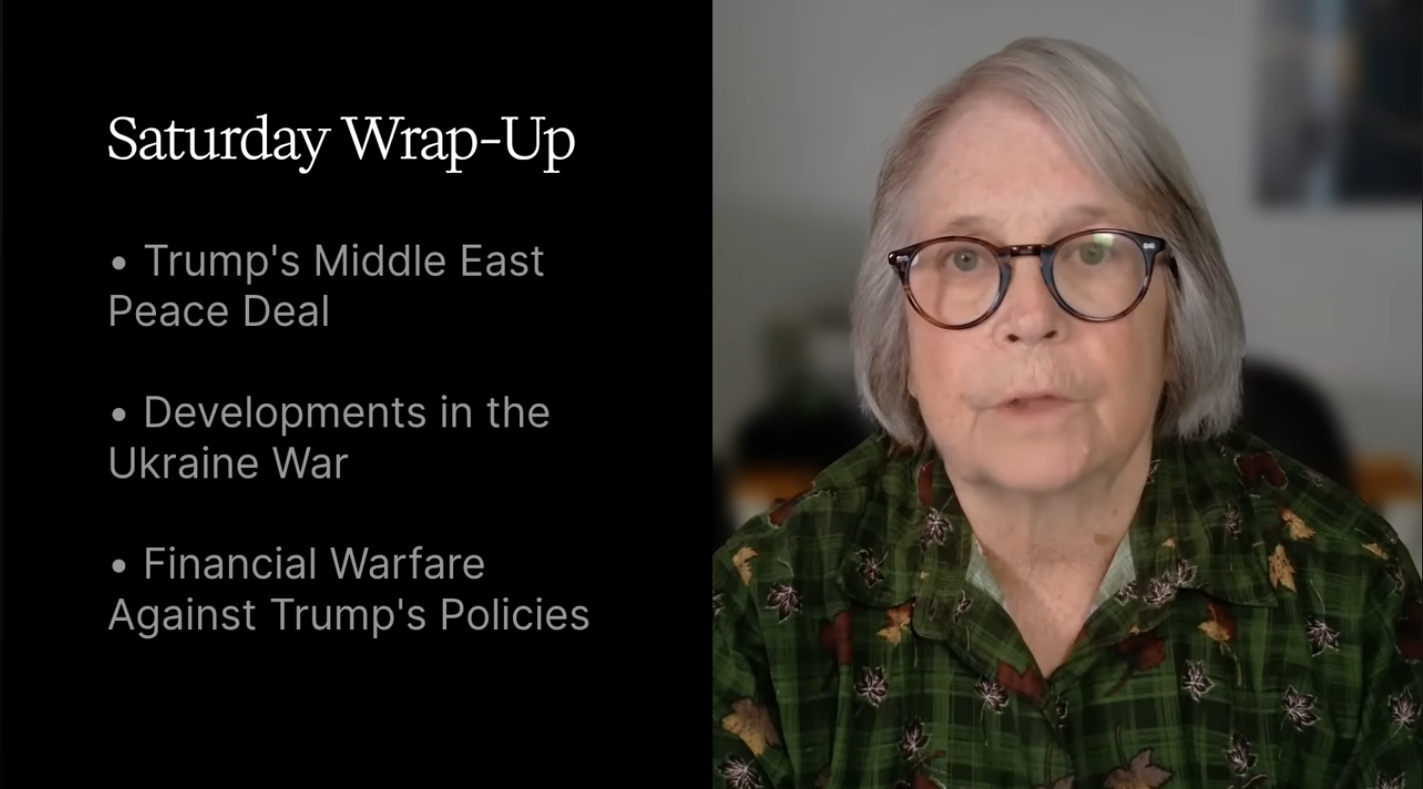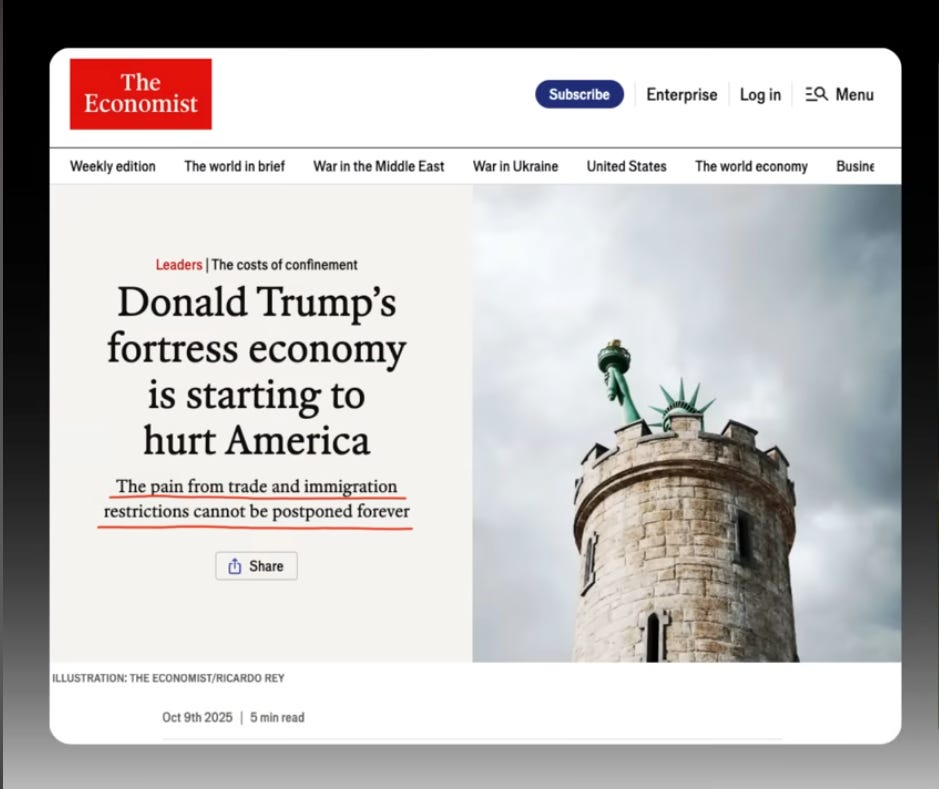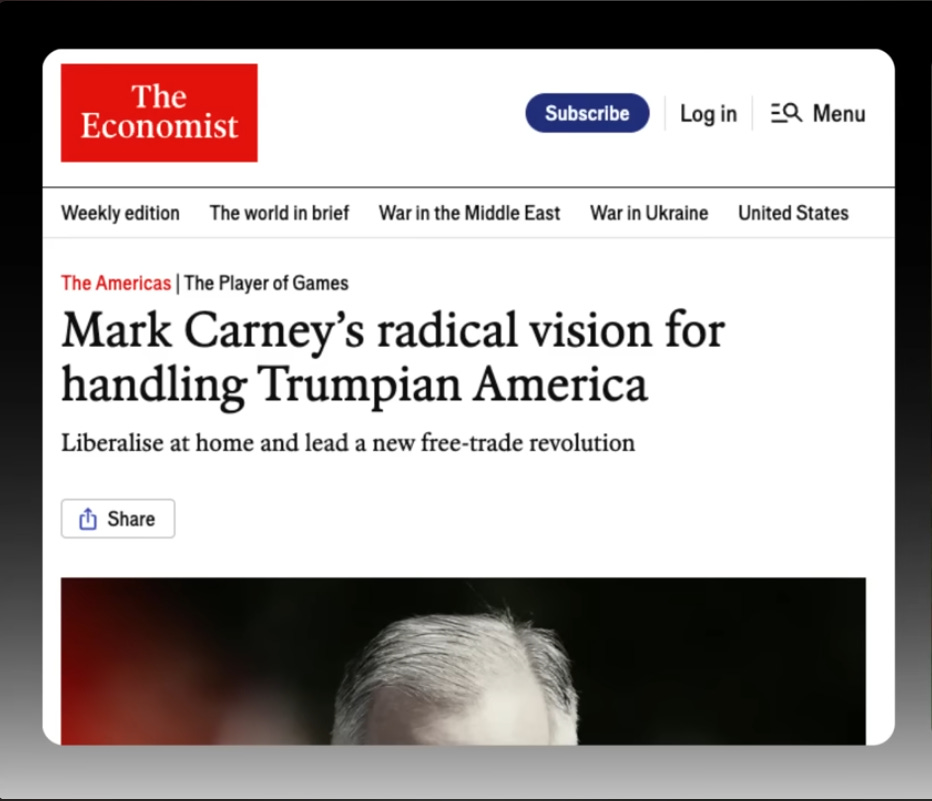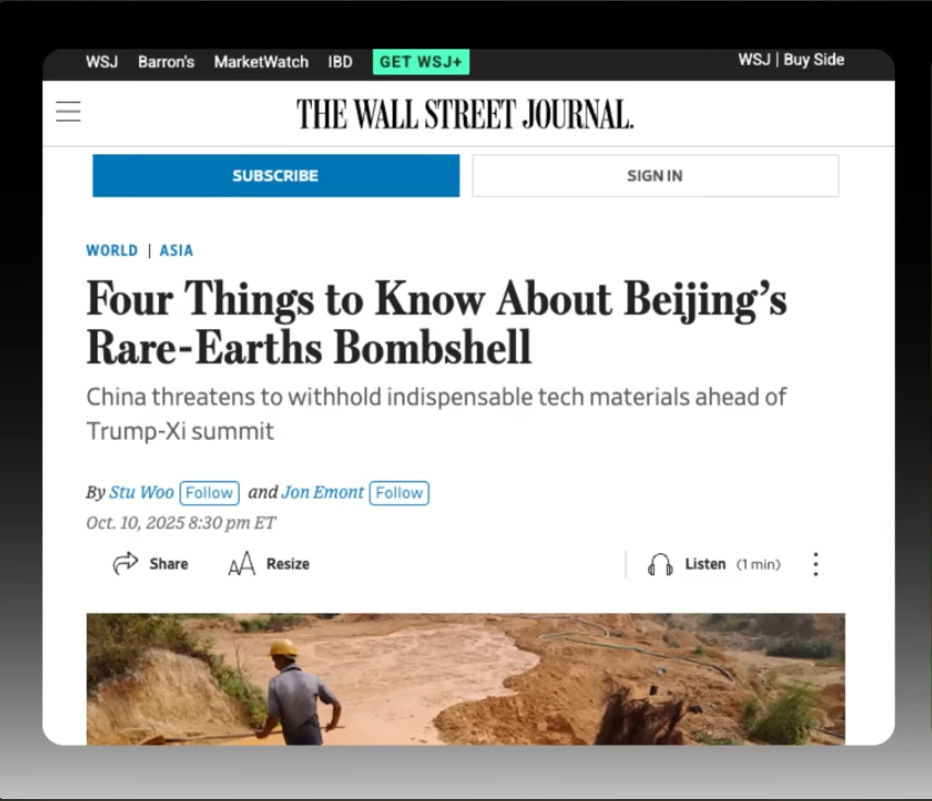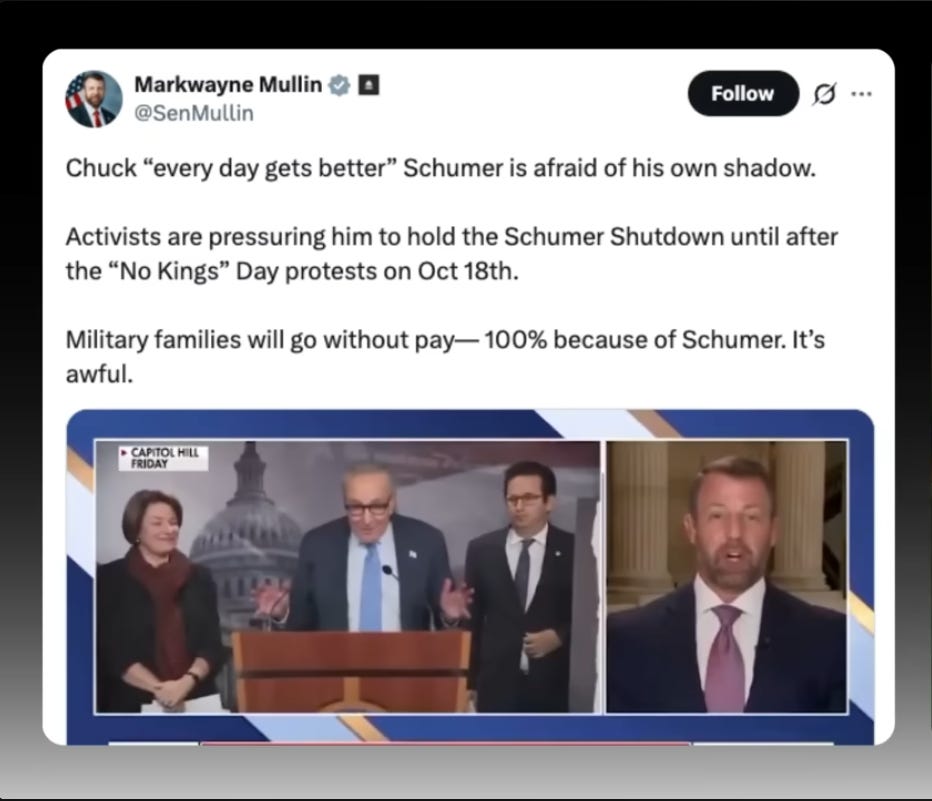Trump Crushing Empire With Middle East Peace: Globalists Launch Economic Chaos
All of this plays into one another. We have to remember many still don’t fully comprehend what Trump is doing with the economy, which is what President Trump’s system economics represents.
The elitists will play that ignorance HEAVILY in the coming weeks, even months
As we learn what is happening, we need to share what we have learned soonest.
Shifting the economy from the finance and investment strategy to a production and building strategy by creating more blue collar jobs is the overall objective - the steps to take this are not clear to most obvious reason,
they did not have to be aware of this until now.
The steps to take this are not clear for many for most obvious reason: they did not have to be aware of this until now.
Barbara Boyd discusses President Donald Trump’s recent breakthrough in Middle East peace negotiations, highlighting his achievements and the responses from political figures like Barack Obama and Vladimir Putin.
The video covers the globalist strategies aimed at destabilizing the U.S. economy, spearheaded by Canada’s Mark Carney, and their efforts to build a new free trade block including Canada, the EU, and Asia.
The episode also touches on the Ukraine conflict, the economic challenges America faces due to inflation, and ongoing internal political strife in the U.S.
Chapters
00:00 Intro
01:58 Trump’s Passion for Peace, Mideast Breakthrough and Ukraine Developments
06:15 Mark Carney’s Anti-Trump, Anti-American Plan
Snapshots and Notes (followed by footnotes)
Canada’s Prime Minister Mark Carney has been chosen by the British Empire elites to destabilize Trump’s agenda - given his record in Canada, all we can say is good luck to him.
Carney loves to play checkers while Trump plays 4D chess.
Per The Economist1 (a Rothschild magazine)…
“The pain from trade and immigration restrictions cannot be postponed forever.”
Too bad they have haven’t created any pain like that yet.
The Economist goes on to say that Mark Carney is building a free trade block composed of Canada, the EU, and Asia to isolate and and outmaneuver Trump.
They are forgetting who wrote the book on making deals and who likes this guy - the Arabs…
More below…
The Contrived ‘It’s the Fault of the Jew’ Factor
Remember what we said in our last post - the British Empire elites are using the same tactic as Hamas and the Palestinians, placing innocents between them and the line of fire.
Only instead of women and children in danger, the British Empire elites place the Jews in the line of fire.
Thus, Netanyahu is their ‘shield’ from their tactics being as plain as day.
The British Empire elites have been doing the same thing for 200 years.
Emissary is the online magazine for none other than the Carnegie Endowment for International Peace2 - and how many wars have they stopped?
None… not they are really trying to.
Trump 8
Winning!
Look into the investments the Carnegie Endowment has overall and you will be wondering why they have an endowment of international peace in the first place.
What’s Next for the Middle East Peace Process
The next steps of the peace process does not even involve Israel - it involves President Trump and the foreign ministers from…
Germany
France
U.K.
Italy
Qatar
United Arab Emirates (UAE)
Jordan
Turkey
Saudi Arabia
Pakistan
Indonesia
Notice Israel is not even attending…
As much of a breakthrough this is, many of Trump’s enemies are congratulating this circumstance but NOT President Trump - that precedence will come back to bite them in the future, and probably very near future.
When Venezuelan figure, Maria Karina Machado, received the Nobel Peace Prize, Putin and many others blasted the Nobel Committee for not giving it to Trump, thereby discrediting once again the value of ANY Noble Prize. To her credit, Machado did accept the Noble Peace Prize for her work against Maduro but dedicated it to President Trump.
It could be easily proven that the Nobel Committee is biased as the first black President, Obama, received a Noble Peace Prize before he even became President - and he had not don a THING to initiate peace anywhere.
They have not been able to defend that move from day one…
The Ukraine Factor
Of course overgrown child actor Zelensky made his support for Trump having the Nobel Peace Prize conditional for selfish purposes… Such childishness is only proving why the Ukraine war drags on.
Not as an intentional move to irk the globalist elites but we are quite sure it did, First Lady Melania Trump shared she has been working directly with Putin to reunite Ukrainian children with their families, thus nuking the Ukrainian lie that Russia has been deliberately kidnapping children, and saying so without any solid proof.
The Mark Carney Circus Arrives to the U.S.
The Economist, a Rockefeller entity, is a prideful publication - they tend to tip their cards way before they are supposed to play and they did so in their support of Central Banker advocate Mark Carney being the puppet to upset President Trump by leveraging China in Canada’s trade.
Anyone who has been following current events for the last 9+ years knows just how stupid that was and just how easily President Trump will trump both Carney and the Rockefeller family; the naysayers will be nothing but shells in the shell game Trump will be playing on them.
The ONLY thing Carney has going for him is his deep ties within the British Empire elites - who won’t think twice to dump him if even looks like he is going to fail. Barbara shares one very wild idea that Carney had that never saw the day of light in this 13 second portion of the video (video continues after the 13 seconds tagged).
Inflation and High Cost of Living Critical to ALL Voters - Thanks to the Passivity of Jerome Powell
This fiasco was inherited by Trump from Biden as well as the Federal Reserve - and the MSM and legacy social media have been and will continue to be ignoring Trump’s economic measure, focusing only on the problems he inherited without mention WHY those problems still exist, only blaming him for something that Jerome Powell has purposely extended long beyond its time.
The interest rate has a LOT to do with the status of the economy3 - it is how it was setup in 1913.
Only just last week did Jerome lower the interest rate by 25 points (0.25%) and says he will do so again 3 more times by the end of the year. This still will take a while to trickle down into the consumer’s pockets but the bigger concern is WILL Jerome keep to his word?
Jerome Powell’s current 4-year term as Chair of the Federal Reserve is set to end on May 15, 2026 - however, he also holds a separate term as a member of the Board of Governors, which is scheduled to end on January 31, 2028. Powell was reappointed for his 2nd 4-year term as Chair on May 23, 2022, following his initial appointment in February 2018.
Which means keep your eyes on the Lisa Cook court situation - successfully unseating her means future Board of Governors can be unseated as well.
Meanwhile, the Left is redirecting the narrative to blame the tariffs for the current inflation. Anyone who has taken Economics 101 knows just how stupid of an argument that is but it is the marketing that counts. So you will be seeing a LOT of push back from Red citizen journalists as well as the Right media. Take notes as the shills will be going after the lowest hanging fruit - anyone showing ignorance as to how tariffs really work.
Already, the Michigan and Texas Chambers of Commerce as well as the Americans for Prosperity group have already amped up their lying to the public - they haven’t changed their negative and uneducated stance on tariffs since before the tariffs were levied.
Rare-Earths Could Be the Next Trade War
Computers, cellular phones, defense, cars are just some of the industries very dependent up rare-earths.
This could set off a trade war between the USA and Canada as well as the USA and China. Carney will make sure Canada remains on China’s side of everything - HOWEVER, the WEXIT actions and plans are not being taken into account and once any one of the Western provinces, ESPECIALLY Alberta, leaves Canada, Carney’s leverage is lost. The more Western Provinces and even Quebec participate in WEXIT the less leverage Carney has.
ICYMI - Alberta and Saskatchewan account for up to 80% of Canada’s resources. Carney’s not going to have much to leverage with once WEXIT becomes reality.
The only possible saving grace for Carney is reforming the Trans-Pacific Partnership Free Trade Agreement4 and negotiations with the EU as a free trade block in opposition to the U.S.
The Trans-Pacific Partnership Free Trade Agreement could consist of…
Australia
Brunai
Canada
Chile
Japan
Malaysia
Mexico
New Zealand
Peru
Singapore
U.K.
Vietnam
Stop and think about that list - if you are any one of those countries that depends upon defense contracts for your own military, are you really about to side with Carney???
Yeah, THAT…
The Democrat Chaos Policy Towards the Government Shutdown and Deportation
Governors of California, Oregon, Illinois are provoking neoconfederate assault on our government as well as violent unrest against ICE.
President Trump has been fighting back by identifying the financial and strategy supporters for ANTIFA, the main group attack ICE at the blessings of the democrat party and Soros - this exposure means whatever government protection they had is now gone as are the capabilities of raising any more funds.
Two indictments also are turning the tide against the Left - Letitia James and John Bolton; they FA and they FO…
Thanks to the awakening of the America population since Trumps’s first time, the antics and attempts by the British Empire elites, Soros, Democrats, ANTIFA, and others are having a tough go of it.
Related Posts
The Economist
The Economist is a British news and current affairs journal founded in 1843 by Scottish economist James Wilson.
It is published in a weekly print magazine format and daily on digital platforms.
The publication covers topics including politics, economics, business, geopolitics, technology, and culture.
Its editorial stance primarily revolves around classical, social, and economic liberalism, favoring policies such as free markets, free trade, free immigration, deregulation, and globalization.
The Economist Group has evolved into a global media and information-services company with a significant international audience.
Recent developments include the Rothschild family, who have held an investment in The Economist since its founding, exploring the sale of their entire 26.7% stake, which is valued at an estimated $537 million.
Perspectives
The Rothschild family’s sale of their stake in The Economist
Lynn Forester de Rothschild is selling the family’s entire 26.7% stake in The Economist, estimated to be worth $537 million (long story shor, the Rothschilds have been have a bit of cash flow problem for several years)
The sale process was formally launched in London and is being advised by Lazard
The Rothschilds have held an influence over The Economist since its founding 182 years ago.
Overall readership of The Economist has been in decline for at least a decade, falling from 1.6 million in 2015 to 1.2 million in 2025, which is cited as a likely reason for the sale (more like an excuse, they didn’t survive for 180+ years on excuses like this one).
Economic viewpoints and impact of Trump’s policies as discussed by economists
Economist Jeffrey Sachs states that US tariffs policy is causing deep global uncertainty (Sachs follows the moves of Soros)
Paul Krugman argues that economists were correct in predicting that Trump’s trade policy would significantly hurt businesses and consumers, contradicting claims that the tariffs were not having a negative impact (Krugman is one of the worst economists around, only the NYT and WSJ keep him around for God only knows why as he only hemorrhages their subscriptions)
Critiques and defenses of Trump’s economic policies by economists
Some sources claim that economists were wrong in predicting negative impacts of Trump’s tariffs and that the real-world evidence contradicts theoretical objections to them - and that is already proving to be true
A ‘MAGA economist’ argues that economic policy must ‘serve the American people’ and reverse deindustrialization by prioritizing domestic production, contrasting with libertarian free-market orthodoxy - the financial and investment economy needed wars to keep going while the production and building economy relies upon the working people to keep going
The Carnegie Endowment for International Peace
The CEIP is a nonpartisan international affairs think tank founded in 1910 by Andrew Carnegie with a gift of $10 million.
Its mission is to advance cooperation between nations and promote active international engagement by the United States (notice it does not say cooperation of WHAT between nations)
The organization aims to achieve practical results through strategic ideas, independent analysis, and diplomacy, helping countries address global problems and advance peace (as long as it involves the financial and investment sectors)
It operates as a global network with headquarters in Washington, D.C., and additional centers in various locations worldwide, including Europe, South Asia, East Asia, and the Middle East.
Interest Rates and the Economy
Interest rates function as a macroeconomic throttle, influencing consumer spending, business investment, and the overall pace of economic growth.
Central banks, such as the U.S. Federal Reserve, adjust interest rates to maintain price stability, promote maximum sustainable employment, and ensure moderate, long-term interest rates.
When central banks lower rates, borrowing becomes cheaper, stimulating economic activity; conversely, higher rates can restrain borrowing and prevent economic excesses.
The state of the economy and inflation are key factors determining the direction of interest rates, with the Federal Reserve lowering rates when the economy is sluggish to boost activity and raising them to cool down inflation.
Interest rates, particularly the federal funds rate, influence short-term interest rates for other financial instruments, which then affect spending decisions of households and businesses, impacting economic activity, employment, and inflation.
Perspectives
Current economic conditions suggest a need for rate cuts to stimulate liquidity and growth.
Despite a solid economic foundation, policy is currently tight, and liquidity is restricted, which may warrant rate cuts.
The median estimate for the neutral rate by the Fed is around 3%, indicating current rates are almost 150 basis points higher than neutral.
The GDP is up by 3%, and favorable economic indicators would typically suggest lowering interest rates.
The Federal Reserve cut interest rates for the first time in 2025 in September, with projections for additional cuts to bring the target range down to 3.50–3.75%.
Economic conditions, including inflation and slow growth, either prevent rate cuts or indicate rates will remain high.
The economy is growing slowly at about 1% to 1.5% annually, and high inflation prevents the government from lowering interest rates to stimulate growth.
The Federal Reserve has maintained interest rates for the third consecutive time amid rising concerns of stagflation (slow growth and rising inflation).
Powell’s comments suggest interest rates will remain high for an extended period, leading to concerns about the stock market compared to the bond market.
Interest rates are influenced by disinflationary forces like weak oil and housing markets, and current rates are expected to remain between 4% and 4.6%.
Past policy decisions under specific administrations have significantly impacted interest rates and economic bubbles.
Interest rates increased significantly from 0.8% on Election Day 2020 to 3.4%, largely due to policies under the Biden administration that impacted domestic energy and led to excessive borrowing and spending.
The Federal Reserve lowered interest rates shortly after President Trump’s victory in 2025 due to concerns about the economy and job creation.
President Trump linked his ambition to reduce energy bills to broader economic challenges and anticipated interest rate cuts.
The Trans-Pacific Partnership (TPP)
TPP was a proposed free trade agreement among 12 Pacific Rim countries, including the United States, that aimed to eliminate tariffs and reduce other barriers to trade and investment.
The TPP would have covered approximately 40% of global trade and aimed to reflect U.S. economic priorities and values.
In January 2017, President Trump formally withdrew the United States from the TPP, preventing its ratification and entry into force.
Following the U.S. withdrawal, the remaining 11 countries negotiated a new agreement, the Comprehensive and Progressive Agreement for Trans-Pacific Partnership (CPTPP), which incorporated most of the original provisions and entered into force on December 30, 2018.
Perspectives
Support for TPP and free trade agreements
The TPP was expected to lead to net positive economic outcomes for all signatory countries and would have served a geopolitical purpose by reducing dependence on Chinese trade and bringing countries closer to the U.S.
The TPP was the cornerstone of the Obama Administration’s economic policy in the Asia Pacific, aimed at increasing American exports and supporting American jobs.
From an international leadership perspective, the U.S. lost out significantly by withdrawing from the TPP.
The Trans-Pacific Partnership exemplified the close link between trade policy and national interests of prosperity, security, and governance, offering benefits to the American domestic economy.
Opposition to TPP and concerns about its impact
The TPP, if implemented, could have contributed to a continuing growth of imports and growing downward pressure on the wages of non-college-educated workers in the United States.
President Trump, Republicans, and many Democrats opposed the TPP in 2016.
The agreement could have affected low-income patients’ access to medicines in signatory countries by reducing generic competition



